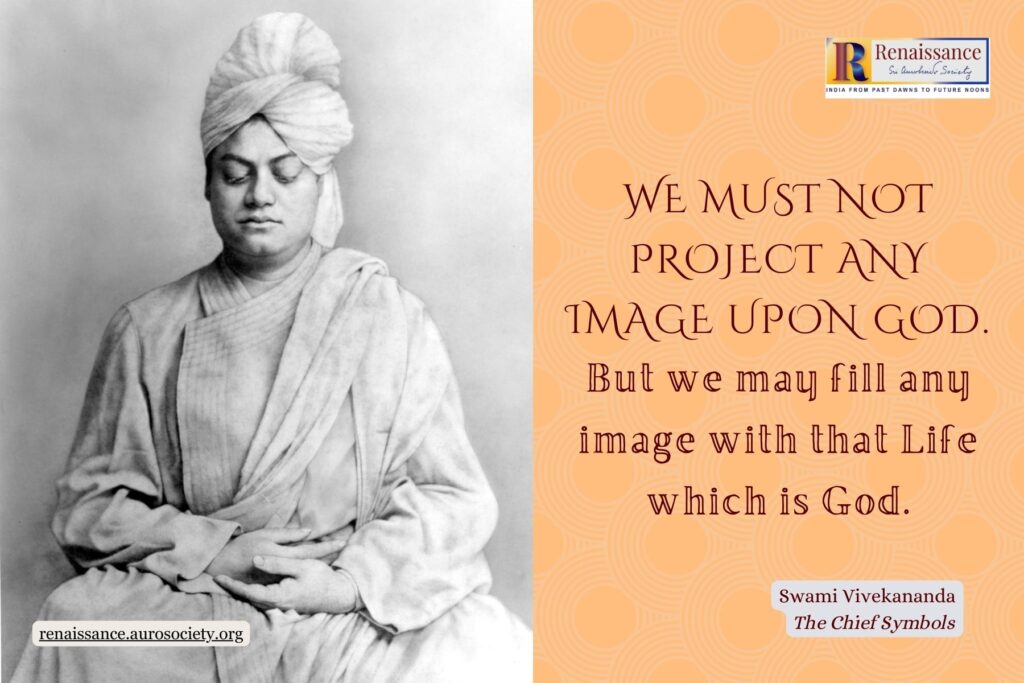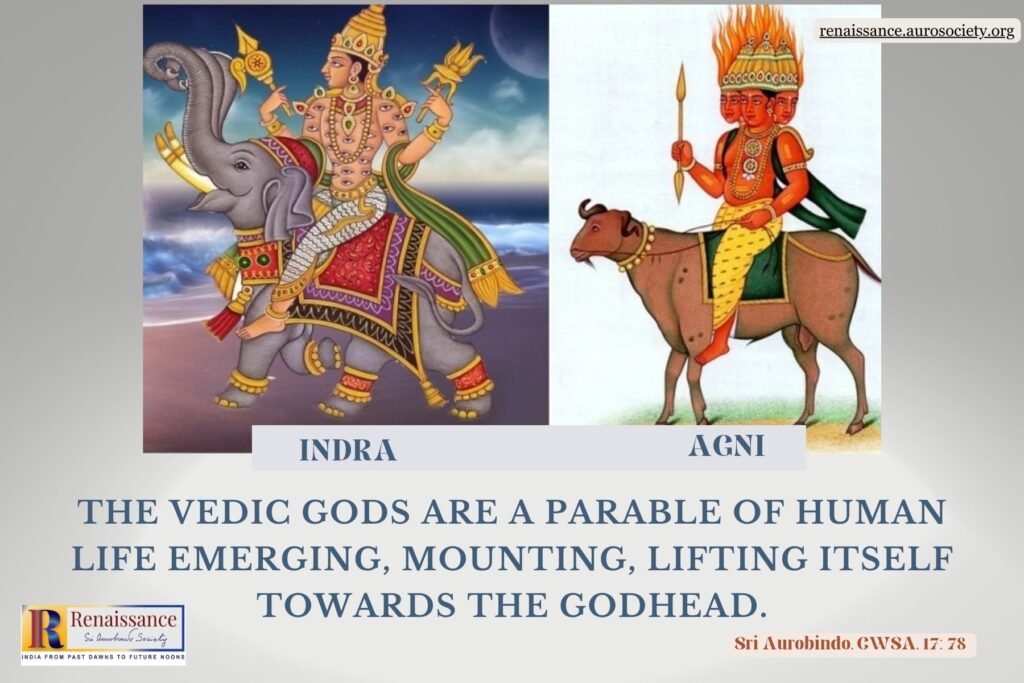Editor’s note: We feature here a few selections from Sri Aurobindo and the Mother highlighting the important differences between a moral life, religious life and spiritual life.

Words of Sri Aurobindo
The spiritual life (adhyātma jīvana), the religious life (dharma jīvana) and the ordinary human life of which morality is a part are three quite different things and one must know which one desires and not confuse the three together.
The ordinary life is that of the average human consciousness separated from its own true self and from the Divine and led by the common habits of the mind, life and body which are the laws of the Ignorance.
The religious life is a movement of the same ignorant human consciousness, turning or trying to turn away from the earth towards the Divine but as yet without knowledge and led by the dogmatic tenets and rules of some sect or creed which claims to have found the way out of the bonds of the earth-consciousness into some beatific Beyond.
The religious life may be the first approach to the spiritual, but very often it is only a turning about in a round of rites, ceremonies and practices or set ideas and forms without any issue.
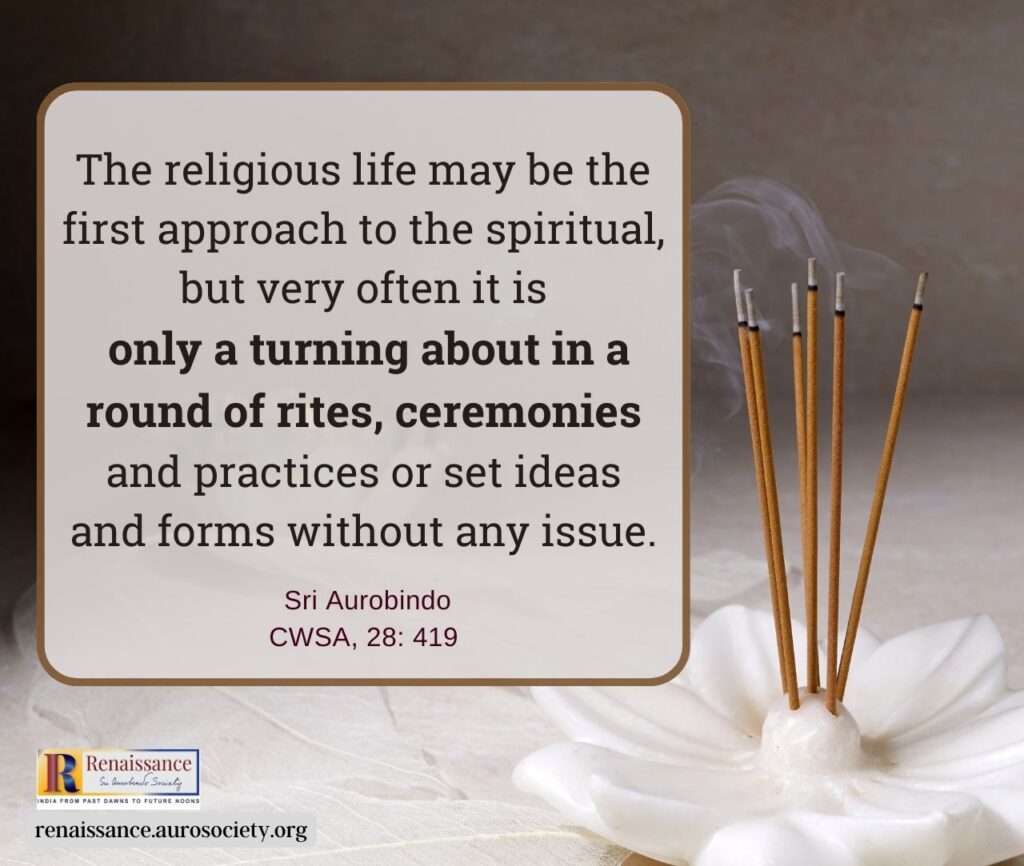
The spiritual life, on the contrary, proceeds directly by a change of consciousness, a change from the ordinary consciousness, ignorant and separated from its true self and from God, to a greater consciousness in which one finds one’s true being and comes first into direct and living contact and then into union with the Divine. For the spiritual seeker this change of consciousness is the one thing he seeks and nothing else matters.
Morality is a part of the ordinary life; it is an attempt to govern the outward conduct by certain mental rules or to form the character by these rules in the image of a certain mental ideal.
The spiritual life goes beyond the mind; it enters into the deeper consciousness of the Spirit and acts out of the truth of the Spirit.
As for the question about the ethical life and the need to realise God, it depends on what is meant by fulfilment of the objects of life. If an entry into the spiritual consciousness is part of it, then mere morality will not give it to you. . . .
. . . worship (pūjā). . . belongs to the religious life. It can, if rightly done in the deepest religious spirit, prepare the mind and heart to some extent but no more.
But if worship is done as part of meditation or with a true aspiration to the spiritual reality and the spiritual consciousness and with the yearning for contact and union with the Divine, then it can be spiritually effective.
~ Sri Aurobindo, CWSA, Vol. 28, pp. 419-420
Read:
Sri Aurobindo on Religion as the Law of Life
Words of The Mother
. . . understand the difference, the great difference between spirituality and morality, two things that are constantly confused with each other.
The spiritual life, the life of Yoga, has for its object to grow into the divine consciousness and for its result to purify, intensify, glorify and perfect what is in you. It makes you a power for manifesting of the Divine; it raises the character of each personality to its full value and brings it to its maximum expression; for this is part of the Divine plan.
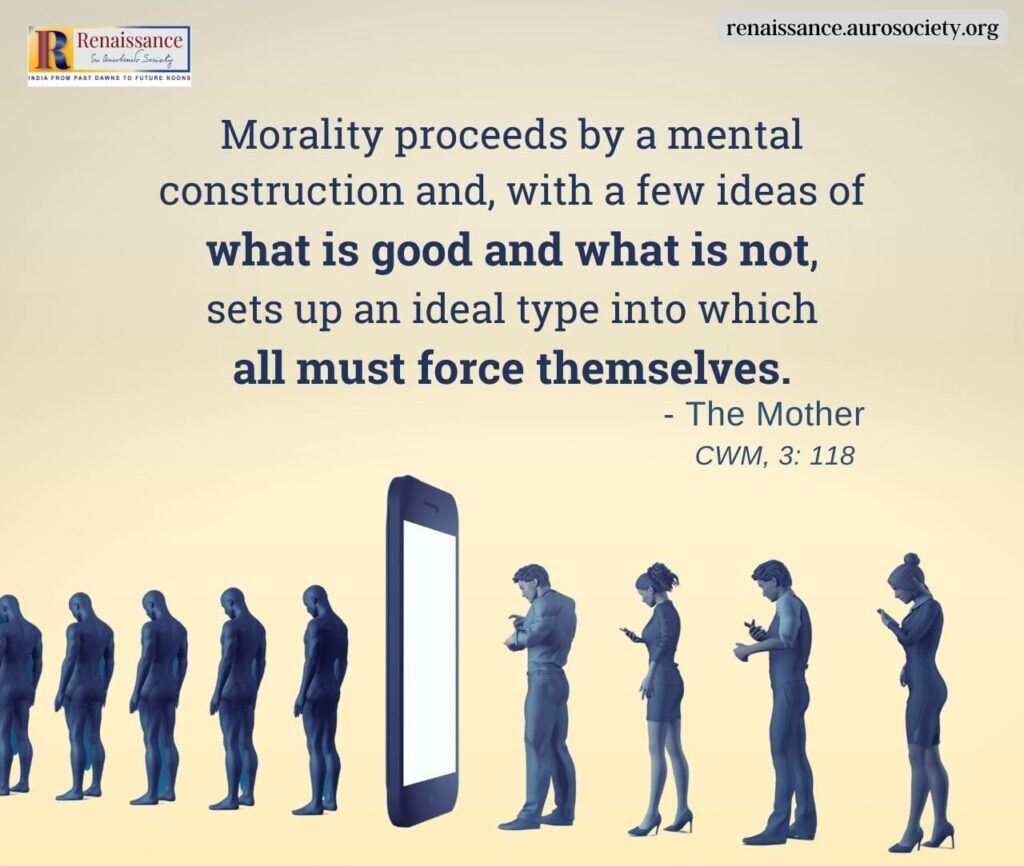
Morality proceeds by a mental construction and, with a few ideas of what is good and what is not, sets up an ideal type into which all must force themselves. This moral ideal differs in its constituents and its ensemble at different times and different places. And yet it proclaims itself as a unique type, a categoric absolute; it admits of none other outside itself; it does not even admit a variation within itself. All are to be moulded according to its single ideal pattern, everybody is to be made uniformly and faultlessly the same. It is because morality is of this rigid unreal nature that it is in its principle and its working the contrary of the spiritual life.
The spiritual life reveals the one essence in all, but reveals too its infinite diversity; it works for diversity in oneness and for perfection in that diversity.
Morality lifts up one artificial standard contrary to the variety of life and the freedom of the spirit. Creating something mental, fixed and limited, it asks all to conform to it. All must labour to acquire the same qualities and the same ideal nature.
Morality is not divine or of the Divine; it is of man and human.
Morality takes for its basic element a fixed division into the good and the bad; but this is an arbitrary notion. It takes things that are relative and tries to impose them as absolutes; for this good and this bad differ in differing climates and times, epochs and countries.
The moral notion goes so far as to say that there are good desires and bad desires and calls on you to accept the one and reject the other. But the spiritual life demands that you should reject desire altogether. Its law is that you must cast aside all movements that draw you away from the Divine. You must reject them, not because they are bad in themselves,—for they may be good for another man or in another sphere,—but because they belong to the impulses or forces that, being unillumined and ignorant, stand in the way of your approach to the Divine.
All desires, whether good or bad, come within this description; for desire itself arises from an unillumined vital being and its ignorance. On the other hand you must accept all movements that bring you into contact with the Divine. But you accept them, not because they are good in themselves, but because they bring you to the Divine.
Accept then all that takes you to the Divine.
Reject all that takes you away from it, but do not say that this is good and that is bad or try to impose your outlook on others; for, what you term bad may be the very thing that is good for your neighbour who is not trying to realise the Divine Life.
– The Mother, CWM, Vol. 3, pp. 117-119)
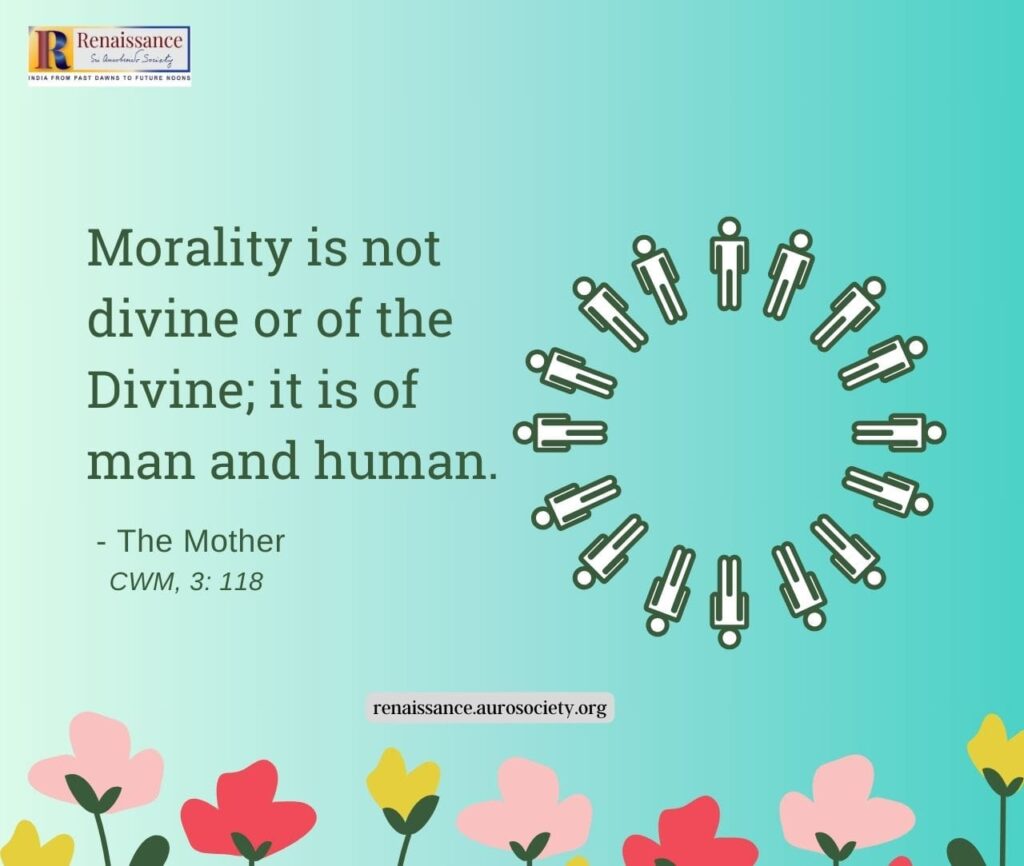
A Conversation with The Mother
Disciple: Sweet Mother, what is an ideal of moral perfection?
There are thousands of moral perfections. Everyone has his own ideal of moral perfection.
What is usually called moral perfection is to have all the qualities that are considered moral: to have no defects, never to make a mistake, never to err, to be always what one conceives to be the best, to have all the virtues—that is, to realise the highest mental conception: to take all the qualities—there are many, aren’t there?—all the virtues, all that man has conceived to be the most beautiful, most noble, most true, and to live that integrally, to let all one’s actions be guided by that, all the movements, all the reactions, all the feelings, all. . . That is living a moral ideal of perfection. It is the summit of man’s mental evolution.
Not many people do it. . . but still. . . there have been some and there still are. This is what men usually take for the spiritual life. When they meet a man of this type, they say, “Oh! He is a great spiritual being.” He may be a great saint, he may be a great sage but he is not a spiritual being.
And yet it is already very good and very difficult to realise this. And there comes a time in the inner evolution when it is very necessary to try to realise it.
It is obviously infinitely higher than to be still guided by all one’s impulses and ignorant outer reactions. It is to be already in a way the master of one’s nature. It is even a stage through which one has to pass, for it is the stage when one begins to be the master of one’s ego, when one is ready to let it fall away—it is still there but sufficiently weakened to be nearing its end.
This is the last stage before crossing over to the other side, and certainly, if anyone imagines that he can go over to the other side without passing through this stage, he would risk making a great mistake, and of taking for perfect freedom a perfect weakness with regard to his lower nature.
It is almost impossible to pass from the mental being—even the most perfect and most remarkable—to the true spiritual life without having realised this ideal of moral perfection for a certain period of time, however brief it may be.
Many people try to take a short-cut and want to assert their inner freedom before having overcome all the weaknesses of the outer nature; they are in great danger of deluding themselves.
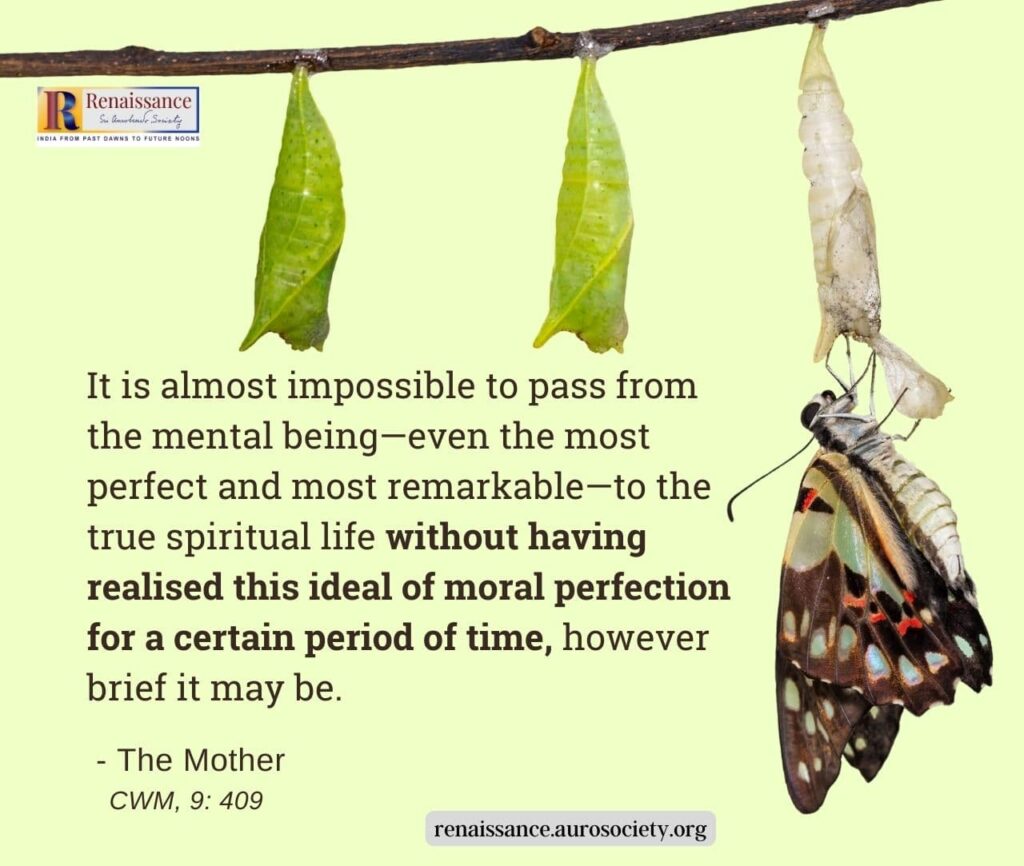
The true spiritual life, complete freedom, is something much higher than the highest moral realisations, but one must take care that this so called freedom is not an indulgence and a contempt for all rules.
One must go higher, always higher, higher; nothing less than what the highest of humanity has achieved.
One must be capable of being spontaneously all that humanity has conceived to be the highest, the most beautiful, the most perfect, the most disinterested, the most comprehensive, the best, before opening one’s spiritual wings and looking at all that from above as something which still belongs to the individual self, in order to enter into true spirituality, that which has no limits, which lives in an integral way Infinity and Eternity.
– The Mother, CWM, Vol. 9, pp. 408-409
Also Read:
The Mother on the Origin and Social Crystallization of Religion
🌸🌸🌸
~ Design: Raamkumar

